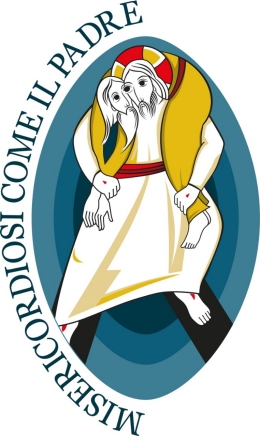Liturgia del giorno
Reader Evangelizo
Error : wrong param « content »
NAME
« Reader Evangelizo »
SYNOPSIS
http://feed.evangelizo.org/v2/reader.php [params...]RETURN VALUE
The « Reader Evangelizo » script return a string with the content requested by "type" parameterThe returned string will be encoded as following :
- UTF-8: for any param "lang"
DESCRIPTION
This manual page documents the « Reader Feed v2.0 » for EVANGELIZO.ORG.With the « Reader Evangelizo » you can get all texts provided by evangelizo.org web service. The « Reader Evangelizo » will help you to display daily reading in your website, or saint of the day .. etc
The « Reader Evangelizo » is used as any PHP file on a website, with params like : file.php?param1=1¶m2=2
PARAMETERS
Usage : http://feed.evangelizo.org/v2/reader.php?param1=«value1»¶m2=«value2»br />| date |
Must be formatted like YYYYMMDD. Can not exceed 30 days from today. |
| type |
Inform about what you want to get - « saint » : to get the saint of the day (with link to life) - « feast » : to get the feast of the day, if there is one (with link to explanation) - « liturgic_t » : to get the liturgic title - « reading_lt » : to get the long title of the reading - « reading_st » : to get the short title of the reading - « reading » : to get the text of the reading - « audio » : to get the URL of audio file if exist - « all » : to get all the readings of the day - « comment_t » : to get the title of the commentary - « comment_a » : to get the author of the commentary - « comment_s » : to get the source of the commentary - « comment » : to get the text of the commentary - « xml » : to get all infos of the day in XML format |
| lang |
Tells the language to display and the liturgical calendar to use for Roman Ordinary Calendar : - « AM » : for american-us language and Roman Ordinary Calendar - « AR » : for arabic language and Roman Ordinary Calendar - « DE » : for german language and Roman Ordinary Calendar - « FR » : for french language and Roman Ordinary Calendar - « GR » : for greek (hellenic) language and Roman Ordinary Calendar - « IT » : for italian language and Roman Ordinary Calendar - « MG » : for malagasy language and Roman Ordinary Calendar - « NL » : for dutch language and Roman Ordinary Calendar - « PL » : for polish language and Roman Ordinary Calendar - « PT » : for portuges language and Roman Ordinary Calendar - « SP » : for spanish language and Roman Ordinary Calendar for other catholics calendars forms : - « ARM » : for armenian language and armenian calendar - « BYA » : for arabic language and byzantine calendar - « COA » : for arabic language and copte calendar - « MAA » : for arabic language and maronite calendar - « SYA » : for arabic language and syriac calendar - « TRA » : for american-us language and Roman extraordinary calendar - « TRD » : for german language and Roman extraordinary calendar - « TRF » : for french language and Roman extraordinary calendar - « TRS » : for spanish language and Roman extraordinary calendar |
| content |
Tells the lecture you want to get for Roman calendar Ordinary form : - « FR » : for the first lecture - « PS » : for the psalm - « SR » : for the second lecture - « GSP » : for the gospel for other catholics calendars forms : - « EP » : for the epistle - « GSP » : for the gospel |
EXAMPLES
| type | date | lang | content | url example | ||
| To get the saint of a day | saint | yyyymmdd | Ordinary forms AM, AR, DE, FR, GR, IT, NL, PL, PT, SP Other forms ARM, BYA, MAA, TRF, TRA |
Ordinary forms FR,PS,SR,GSP Other forms EP,GSP |
http://feed.evangelizo.org/v2/reader.php?date=20190427&type=saint&lang=IT | |
| To get the feast of a day | feast | http://feed.evangelizo.org/v2/reader.php?date=20190427&type=feast&lang=AM | ||||
| To get the liturgic title of a day | all | liturgic_t | http://feed.evangelizo.org/v2/reader.php?date=20190427&type=liturgic_t&lang=FR | |||
| To get the long reading title of a day | reading_lt | http://feed.evangelizo.org/v2/reader.php?date=20190427&type=reading_lt&lang=SP&content=FR | ||||
| To get the short reading title of a day | reading_st | http://feed.evangelizo.org/v2/reader.php?date=20190427&type=reading_st&lang=TRF&content=EP | ||||
| To get the text of the reading of a day | reading | http://feed.evangelizo.org/v2/reader.php?date=20190427&type=reading&lang=DE&content=GSP | ||||
| To get the commentary title of a day | comment_t | http://feed.evangelizo.org/v2/reader.php?date=20190427&type=comment_t&lang=PT | ||||
| To get the commentary author of a day | comment_a | http://feed.evangelizo.org/v2/reader.php?date=20190427&type=comment_a&lang=FR | ||||
| To get the commentary source of a day | comment_s | http://feed.evangelizo.org/v2/reader.php?date=20190427&type=comment_s&lang=PL | ||||
| To get the commentary text of a day | comment | http://feed.evangelizo.org/v2/reader.php?date=20190427&type=comment&lang=MAA |
PHP example
$today = date('Ymd');
$url = "http://feed.evangelizo.org/v2/reader.php?date=$today&type=comment&lang=FR";
$h = fopen($url,"r");
while (!feof($h)) {
$str .= fgets($h);
}
print $str;
Javascript example 1
<html>
<head>
<title>Exemple d'affichage de fichier texte</title>
<script language="javascript" type="text/javascript">
function displayTextFile(filePath){
iframe = document.getElementsByName('textDisplay')[0];
iframe.src=filePath;
iframe.style.display="block";
}
</script>
</head>
<body>
<iframe id="textDisplay" name="textDisplay" src="" style="width: 400px; height: 240px; display: none;"></iframe>
<script>
var currentTime = new Date();
var month = currentTime.getMonth() + 1;
var day = currentTime.getDate();
var year = currentTime.getFullYear();
if (day < 10) day = '0'+day;
if (month < 10) month = '0'+month;
displayTextFile('http://feed.evangelizo.org/v2/reader.php?date='+year+month+day+'&type=reading&lang=FR&content=GSP');
</script>
</body>
</html>
PRIMA LETTURA Libro di Geremia 7,1-11.
Questa è la parola che fu rivolta dal Signore a Geremia:"Fermati alla porta del tempio del Signore e là pronunzia questo discorso dicendo: Ascoltate la parola del Signore, voi tutti di Giuda che attraversate queste porte per prostrarvi al Signore.
Così dice il Signore degli eserciti, Dio di Israele: Migliorate la vostra condotta e le vostre azioni e io vi farò abitare in questo luogo.
Pertanto non confidate nelle parole menzognere di coloro che dicono: Tempio del Signore, tempio del Signore, tempio del Signore è questo!
Poiché, se veramente emenderete la vostra condotta e le vostre azioni, se realmente pronunzierete giuste sentenze fra un uomo e il suo avversario;
se non opprimerete lo straniero, l'orfano e la vedova, se non spargerete il sangue innocente in questo luogo e se non seguirete per vostra disgrazia altri dei,
io vi farò abitare in questo luogo, nel paese che diedi ai vostri padri da lungo tempo e per sempre.
Ma voi confidate in parole false e ciò non vi gioverà:
rubare, uccidere, commettere adulterio, giurare il falso, bruciare incenso a Baal, seguire altri dei che non conoscevate.
Poi venite e vi presentate alla mia presenza in questo tempio, che prende il nome da me, e dite: Siamo salvi! per poi compiere tutti questi abomini.
Forse è una spelonca di ladri ai vostri occhi questo tempio che prende il nome da me? Anch'io, ecco, vedo tutto questo".
Copyright @ Conferenza Episcopale Italiana [2003 11 05]
Per ricevere il Vangelo ogni mattina per e-mail, iscrivetevi : vangelodelgiorno.org
SALMO Salmi 84(83),3.4.5-6a.8a.11.
L'anima mia languisce e bramagli atri del Signore.
Il mio cuore e la mia carne
esultano nel Dio vivente.
Anche il passero trova la casa,
la rondine il nido, dove porre i suoi piccoli,
presso i tuoi altari, Signore degli eserciti,
mio re e mio Dio.
Beato chi abita la tua casa:
sempre canta le tue lodi!
Beato chi trova in te la sua forza;
cresce lungo il cammino il suo vigore.
Per me un giorno nei tuoi atri
è più che mille altrove,
stare sulla soglia della casa del mio Dio
è meglio che abitare nelle tende degli empi.
Copyright @ Conferenza Episcopale Italiana [2003 11 05]
Per ricevere il Vangelo ogni mattina per e-mail, iscrivetevi : vangelodelgiorno.org
SECONDA LETTURA
Copyright @ Conferenza Episcopale Italiana [2003 11 05]
Per ricevere il Vangelo ogni mattina per e-mail, iscrivetevi : vangelodelgiorno.org
Dal Vangelo secondo Matteo 13,24-30.
In quel tempo, Gesù espose alla folla una parola: «Il regno dei cieli si può paragonare a un uomo che ha seminato del buon seme nel suo campo.Ma mentre tutti dormivano venne il suo nemico, seminò zizzania in mezzo al grano e se ne andò.
Quando poi la messe fiorì e fece frutto, ecco apparve anche la zizzania.
Allora i servi andarono dal padrone di casa e gli dissero: Padrone, non hai seminato del buon seme nel tuo campo? Da dove viene dunque la zizzania?
Ed egli rispose loro: Un nemico ha fatto questo. E i servi gli dissero: Vuoi dunque che andiamo a raccoglierla?
No, rispose, perché non succeda che, cogliendo la zizzania, con essa sradichiate anche il grano.
Lasciate che l'una e l'altro crescano insieme fino alla mietitura e al momento della mietitura dirò ai mietitori: Cogliete prima la zizzania e legatela in fastelli per bruciarla; il grano invece riponetelo nel mio granaio».
Copyright @ Conferenza Episcopale Italiana [2003 11 05]
Per ricevere il Vangelo ogni mattina per e-mail, iscrivetevi : vangelodelgiorno.org
Commento al Vangelo
C'è uno zelo eccessivo, sempre teso, inquieto, tormentato, agitato; nulla è mai abbastanza perfetto per le anime possedute da tale ardore. (...) [S. Benedetto] previene l'Abate con cura contro questo zelo inopportuno. "Non sia confusionario, inquieto, impaziente, ostinato, geloso, troppo supponente, ché altrimenti non avrà mai riposo". "Nel correggere stesso, agisca con prudenza e non commetta eccessi; per paura che volendo togliere troppo la ruggine dal vaso e renderlo troppo pulito, lo rompa..." (Regola, cap. 69). Perché è amaro questo zelo? Perché è impaziente, indiscreto, e manca d'unzione.E' di questo zelo che parla Nostro Signore nella parabola del seminatore, quando i servi chiedono al padrone del campo di andare a raccogliere la zizzania seminata dal nemico, non pensando che rischiano di raccogliere anche il buon grano. "Vuoi che andiamo a raccoglierla?" (Mt 13,28) E' questo lo zelo che riempiva i discepoli d'indignazione e li faceva chiedere il fuoco dal cielo sulla città della Samaria per punirla di non aver accolto il divino Maestro. "Signore, vuoi che diciamo che scenda un fuoco dal cielo e li consumi?" (Lc 9,54) Ma cosa risponde Cristo Gesù a questo ardore che li travolge? "Ma egli si voltò verso di loro e li sgridò. E disse: "Voi non sapete di quale spirito siete animati. Poiché il Figlio dell’uomo non è venuto per perdere le anime degli uomini, ma per salvarle".(Lc 9,55-56 riv. 2006)
vangelodelgiorno.org












